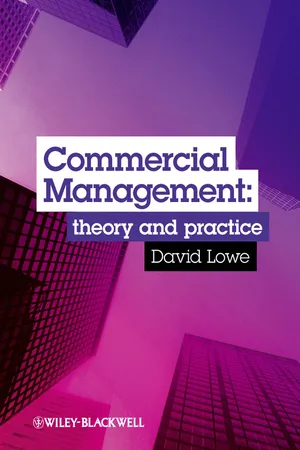
- English
- ePUB (mobile friendly)
- Available on iOS & Android
About this book
Commercial Management: theory and practice defines the role of commercial management within project-oriented organisations, providing a framework for and helping to develop a critical understanding of the factors that influence commercial management practice. It also identifies generic aspects of this practice and provides a theoretical foundation to these activities, by reference to existing and emergent theories and concepts, as well as to relevant management best practice.
The book is structured into four parts: Part 1 Introduction – Commercial Management in Project Environments explores the nature of commercial practice within project-oriented organisations at the buyer-seller interface. It presents a Commercial Management framework, which illustrates the multiple interactions and connections between the purchaser's procurement cycle and a supplier's bidding and implementation cycles. Additionally, it outlines the principle activities undertaken by the commercial function, identifies the skills and abilities that support these activities and reviews the theories and concepts that underpin commercial practice. Finally, it identifies areas of commonality of practice with other functions found within project-oriented organisations, plus sources of potential conflict and misunderstanding.
Part 2 – Elements of Commercial Theory and Practice covers commercial leadership; exploring strategy; risk and uncertainty management; financial decision-making; and key legal issues. Part 3 – Approaches to Commercial Practice addresses best practice management; and commercial and contracting strategies and tactics. Finally, Part 4 – Case Studies offers two extended case studies: Football Stadia (the Millennium Stadium, Cardiff; the Emirates Stadium, Islington; and Wembley Stadium, London); and Heathrow Terminal 5.
The book provides a one-stop-shop to the many topics that underpin commercial management practice from both a demand (buy-side) and a supply (sell-side) perspective. It will help develop an understanding of the issues influencing commercial management: leadership, strategy, risk, financial, legal, best practice management and commercial and contracting strategy and tactics.
This book's companion website is at http://www.wiley.com/go/lowecommercialmanagement and offers invaluable resources for both students and lecturers:
• PowerPoint slides for lecturers on each chapter
• Sample exam questions for students to practice
• Weblinks to key journals and relevant professional bodies
Frequently asked questions
- Essential is ideal for learners and professionals who enjoy exploring a wide range of subjects. Access the Essential Library with 800,000+ trusted titles and best-sellers across business, personal growth, and the humanities. Includes unlimited reading time and Standard Read Aloud voice.
- Complete: Perfect for advanced learners and researchers needing full, unrestricted access. Unlock 1.4M+ books across hundreds of subjects, including academic and specialized titles. The Complete Plan also includes advanced features like Premium Read Aloud and Research Assistant.
Please note we cannot support devices running on iOS 13 and Android 7 or earlier. Learn more about using the app.
Information
Part 1
Introduction
| Introduction | Commercial Management |
| Chapter 1 | Commercial Management in Project-Oriented Organisations |
Introduction
Commercial Management
- Define the terms ‘commercial management’ and ‘commercial manager’
- Identify common activities undertaken by commercial managers (practitioners)
- Describe the position of ‘commercial’ within global, project-oriented organisations
Introduction
What is commercial management?
- Telecommunications, electronics and ICT
- Services and outsourcing
- Energy and oil
- Defence and aerospace
- Financial services
- Pharmaceuticals and health care
- Engineering and construction
| Definition | Source |
| The process of controlling or administering the financial transactions of an organisation with the primary aim of generating a profit | Lowe et al. (1997) |
| The management of contractual and commercial issues relating to projects, from project inception to completion | Lowe and Leiringer (2005, 2006) |
| The identification and development of business opportunities and the profitable management of projects and contracts,from inception to completion | International Association for Contract and Commercial Management (IACCM)/The Institute of Commercial Management (ICM) (IACCM, ND) |
Definitions of commercial management
Definitions of commercial manager
| Definition | Source |
| … a person controlling or administering the financial transactions of an organisation with the primary aim of generating a profit | Lowe et al. (1997) |
| … is someone whose primary role is in the management or execution of such opportunities or projects2 | International Association for Contract and Commercial Management (IACCM)/The Institute of Commercial Management (ICM) (IACCM, ND) |
| Definition | Source |
| Contract management is a niche within the procurement profession, but it has a very broad perspective in terms of the responsibilities assigned to a contract manager. The job scope ranges from the administrative skills of managing, organizing, and planning, to the excitement and challenge of negotiating a major contract | National Contract Management Association (NCMA, 2011) |
| Contract management is the process that enables both parties to a contract to meet their obligations in order to deliver the objectives required from the contract. It also involves building a good working relationship between customer and provider. It continues throughout the life of a contract and involves managing proactively to anticipate future needs as well as reacting to situations that arise | Office of Government Commerce (OGC, 2002) |
| Contract management is the process of managing and administrating the … contract from the time it has been agreed at contract award, through to the end of the service period … | Public Private Partnerships Programme (4Ps, 2007) |
| Contract management is the phase of the procurement cycle in which a supplier delivers the required goods or services in accordance with a procuring authority’s specification | OGC (2009) |
| Ongoing monitoring and management of the provision of services in line with the agreed terms and conditions | Victorian Government Purchasing Board (VGPB, 2011) |
Definitions of contract management
Table of contents
- Cover
- Title page
- Copyright page
- Dedication
- Access to Companion Site
- About the Author
- About the Contributors
- Acknowledgements
- Preface
- Abbreviations
- Part 1: Introduction
- Part 2: Elements of Commercial Practice and Theory
- Part 3: Approaches to Commercial Practice
- Part 4: Case Studies
- Index